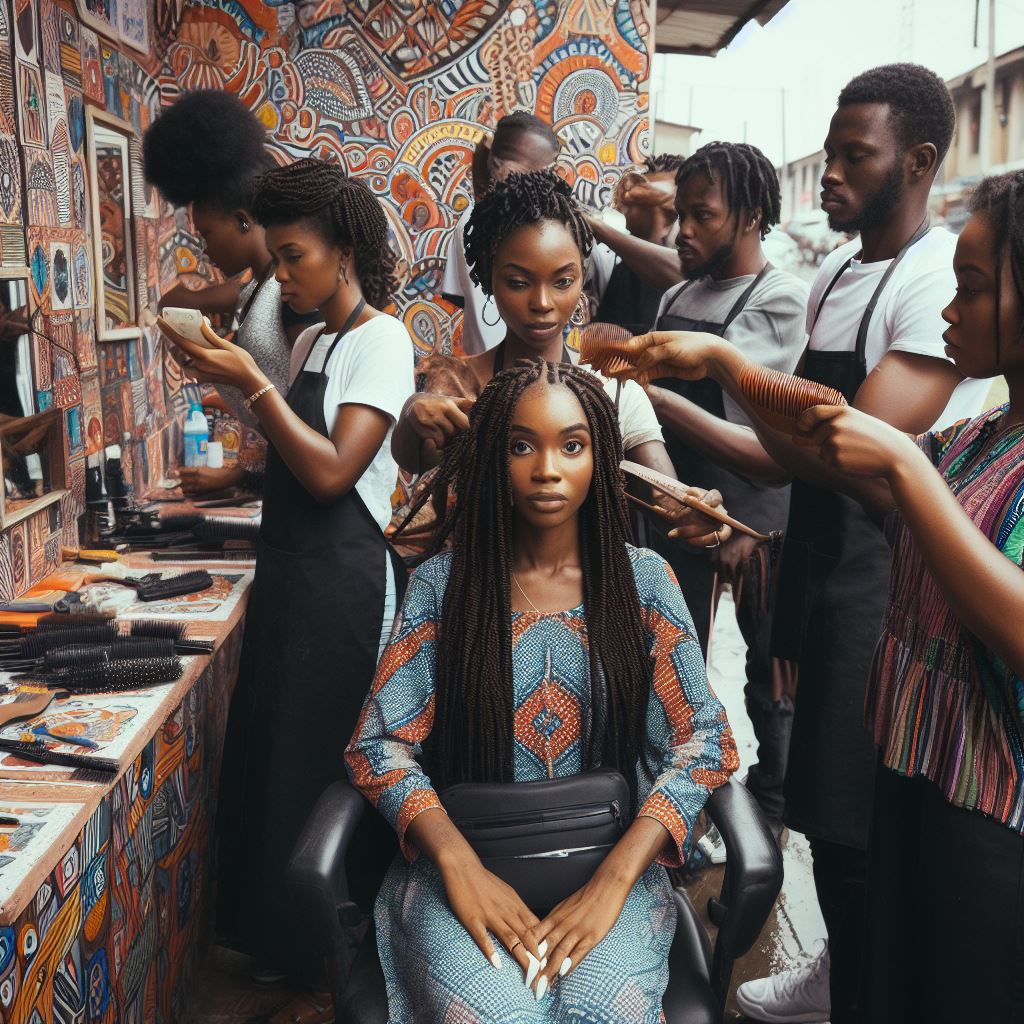Introduction
In the dynamic landscape of Nigeria’s burgeoning hair stylist industry, notable growth and prominence have emerged.
This blog post is tailored to serve as a compass for aspiring hair stylists, offering valuable insights into initiating their training journey effectively.
Amidst the vibrant tapestry of the Nigerian hair stylist scene, the salon business stands as a key player.
Establishing a salon in Nigeria requires a keen understanding of local trends, customer preferences, and business dynamics.
Aspiring stylists should consider incorporating a list of essential elements when setting up their salon, such as a curated service menu, quality products, and effective marketing strategies.
By leveraging these insights, budding professionals can embark on their hair styling journey with confidence, ready to contribute to the thriving salon culture in Nigeria.
Researching the Hair Stylist Training Landscape in Nigeria
When considering a career in hair styling in Nigeria, it is essential to research the various training options available in the country.
Understanding the different types of training programs will help aspiring hair stylists choose the most suitable one for their goals and aspirations.
1. Vocational Schools
Vocational schools are institutions that specialize in providing practical skills training for specific careers, including hair styling.
These schools usually offer comprehensive training programs that cover various aspects of hair styling, such as cutting, coloring, perming, and styling techniques.
The advantages of attending a vocational school include structured and standardized training, hands-on experience, access to professional equipment, and exposure to industry practices.
However, some disadvantages may include high tuition fees, limited theoretical education, and the need for self-motivation.
2. Academies
Hair styling academies are private institutions that focus solely on providing education and training for hair stylists.
These academies often have partnerships with renowned hair care brands, which can enhance the quality of education and provide networking opportunities for students.
Attending a hair styling academy offers benefits such as specialized training, industry connections, exposure to the latest trends and techniques, and access to professional mentors.
Nevertheless, potential drawbacks may include higher costs compared to other training options and limited availability in certain locations.
3. Apprenticeships
Apprenticeships involve learning on the job under the guidance of experienced hair stylists.
This training method provides hands-on experience and practical skills development while working in a salon or hair studio environment.
The advantages of apprenticeships include real-world experience, personalized guidance, networking opportunities, and the potential to earn a salary while training.
However, the duration of apprenticeships can be longer compared to formal training programs, and availability may vary depending on the availability of experienced stylists willing to take on apprentices.
Importance of Selecting Credible and Recognized Training Programs
Regardless of the chosen training option, it is crucial to select credible and recognized programs to ensure quality education and enhance career prospects. Here are some reasons why:
- Credibility and Recognition: Employers and clients value reputable training programs, which can improve job opportunities and trust in your skills.
- Industry Standards: Recognized training programs adhere to industry standards, ensuring that you acquire the knowledge and techniques needed to excel in the field.
- Networking and Placement Opportunities: Established programs often have partnerships and connections within the industry, providing networking and placement opportunities for their graduates.
- Continuing Education: Some recognized programs offer opportunities for further education and specialization, allowing you to stay updated with industry advancements.
In fact, researching the hair stylist training landscape in Nigeria is vital for aspiring stylists.
Vocational schools, academies, and apprenticeships each have their advantages and disadvantages, and it is essential to consider personal goals, financial capabilities, and location when deciding on a training program.
Additionally, opting for credible and recognized training programs will contribute to professional growth and enhance career opportunities in the exciting world of hair styling.
Read: Building Trust: Transparency in Fundraising in Nigeria
Vocational Schools for Hair Stylist Training
When it comes to pursuing a career in hair styling in Nigeria, vocational schools are a great place to start.
These specialized institutions offer comprehensive training in the art of hair styling, preparing individuals for a successful career in the beauty industry.
1. Detailed Explanation of Vocational Schools
Vocational schools for hair stylist training in Nigeria are educational institutions that focus on providing specialized courses in hair styling.
These schools aim to equip students with the necessary skills and knowledge to excel in the field.
These schools hire experienced and skilled instructors who have years of practical experience in the hair styling industry. By learning from seasoned professionals, students can gain valuable insights and hands-on experience that will enhance their skills.
2. Curriculum Offered
The curriculum offered by vocational schools for hair stylist training in Nigeria is designed to provide a well-rounded education.
It encompasses both theoretical knowledge and practical experience, ensuring that students have a strong foundation in hair styling techniques.
The theoretical knowledge includes subjects like hair anatomy, scalp health, chemical treatments, and hair care products.
Students learn about different hair types, face shapes, and how to choose the right hairstyle for their clients.
In addition to theoretical education, students also receive extensive practical training.
They learn various hair cutting, coloring, and styling techniques. Students practice these techniques on mannequin heads and live models to develop their skills under the guidance of their instructors.
3. Duration, Cost, and Potential Certifications
The duration of hair stylist training programs in vocational schools can vary.
Some programs can be completed in a few months, while others may take up to a year or more, depending on the level of specialization.
The cost of these programs also varies. It is essential to research different vocational schools and compare their fees before making a decision.
However, it is important to remember that quality education often comes at a higher price.
Upon successful completion of a hair stylist training program, students may obtain certifications to validate their skills and knowledge.
These certifications can enhance their employability and provide them with a competitive edge in the job market.
Common certifications obtained from vocational schools for hair stylist training in Nigeria include the National Vocational Certificate (NVC) and the City & Guilds of London Certificate.
These certifications are recognized both locally and internationally, opening up opportunities for employment worldwide.
Vocational schools specializing in hair stylist training in Nigeria offer aspiring individuals a pathway to a rewarding career in the beauty industry.
By enrolling in these schools, students can acquire the skills, knowledge, and certifications necessary to thrive in the field of hair styling.
It is advisable to thoroughly research different vocational schools, consider their curriculum, duration, cost, and potential certifications before making a decision.
With the right training and dedication, aspiring hair stylists can embark on a successful journey in the exciting world of hair styling.
Read: International Views: Fundraising in Nigeria Compared
Academies for Hair Stylist Training
When it comes to pursuing a career in hair styling, finding the right training academy is crucial.
In Nigeria, there are several renowned academies that offer comprehensive programs to aspiring hair stylists. Let’s take a closer look at some of these academies:
1. Academy of Hair Design and Beauty Therapy (AHDBT)
The Academy of Hair Design and Beauty Therapy (AHDBT) is one of the most respected hair stylist academies in Nigeria.
It is known for its excellent training programs and state-of-the-art facilities.
The academy offers a wide range of courses, including basic hairstyling, advanced cutting techniques, color theory, and specializations in bridal or editorial styling. AHDBT has a strong reputation for producing skilled and creative hair stylists.
Notable alumni from AHDBT include renowned hairstylist Tunde Oyeyode, who has styled hair for numerous celebrities and fashion shows.
2. Nigerian Institute of Hairdressing and Cosmetology (NIHC)
The Nigerian Institute of Hairdressing and Cosmetology (NIHC) is another top-notch academy for aspiring hair stylists in the country.
It is known for its extensive curriculum and experienced instructors.
NIHC offers training programs in various areas, such as hair cutting, styling, chemical treatments, and salon management.
The academy emphasizes hands-on experience and provides students with opportunities to work on real clients.
One of the success stories from NIHC is Victoria Obi, who started her own successful salon after completing her training at the institute.
3. Hair Africa Training Academy (HATA)
Hair Africa Training Academy (HATA) is a recognized academy that focuses on empowering individuals with the skills needed to excel in the hair industry.
HATA offers comprehensive training programs that cover a wide range of techniques, including braiding, extensions, wig making, and natural hair care.
The academy is known for its commitment to nurturing creativity and professionalism in its students.
One notable alumna from HATA is Chioma Opara, who has gained recognition for her innovative hairstyling techniques and has been featured in various magazines.
4. International School of Hair Design (ISHD)
The International School of Hair Design (ISHD) is an esteemed academy that provides students with all the necessary skills and knowledge to succeed in the hair industry.
ISHD offers specialized courses in different areas, such as barbering, hair coloring, and scalp treatment.
The academy focuses on practical training and ensures that students receive hands-on experience in a professional salon environment.
One of the notable alumni from ISHD is Charles Omoniyi, who has gained recognition for his expertise in creating unique and trendsetting hairstyles.
When choosing a hair stylist training academy, it is essential to consider factors such as reputation, curriculum, and success stories.
These academies in Nigeria have a proven track record of producing skilled and successful hair stylists.
Whether you aspire to work in a high-end salon, become a freelance hairstylist, or even start your own business, these academies can provide you with the necessary skills and knowledge to kickstart your career in the exciting world of hair styling.
Read: Fundraising Education in Nigeria: What to Know

Apprenticeships and On-the-Job Training
Apprenticeships in the hair styling industry can provide valuable hands-on experience to aspiring hair stylists.
This form of training allows individuals to learn from experienced professionals and gain practical skills in a real-world salon environment.
There are several benefits to learning through apprenticeships.
First and foremost, apprenticeships offer a unique opportunity to observe and participate in the daily operations of a hair salon.
This hands-on experience gives aspiring stylists the chance to apply their knowledge and techniques on actual clients, under the guidance of a mentor.
Another advantage of apprenticeships is the chance to build a professional network.
Working closely with experienced stylists and salon owners allows apprentices to establish relationships within the industry.
These connections can be useful when seeking employment or furthering one’s career in the future.
While apprenticeships provide numerous benefits, they also come with their fair share of challenges.
One of the main challenges is finding reputable hair salons or stylists who offer apprenticeships.
It is important to do thorough research and seek recommendations from trusted sources to ensure that the chosen apprenticeship program is legitimate and provides quality training.
Tips for finding reputable hair salons or stylists who offer apprenticeships in Nigeria:
- Seek recommendations from friends, family, or other professionals in the hair styling industry.
- Utilize online platforms and social media to search for salon apprenticeship programs and read reviews from previous apprentices.
- Visit local hair salons and inquire about the availability of apprenticeship opportunities.
- Attend industry events, workshops, or seminars where you can network with established professionals and learn about potential apprenticeship opportunities.
- Reach out to professional associations or organizations related to hair styling, as they may have information on reputable salons offering apprenticeships.
Selecting the right apprenticeship program is crucial in ensuring a successful start to a career in hair styling.
It is essential to choose a salon or stylist with a proven track record of providing comprehensive training and mentorship.
During the apprenticeship, it is important to actively engage in the learning process.
Be proactive in asking questions, seeking feedback, and practicing the skills learned. Take advantage of the opportunity to observe and learn from experienced professionals.
Furthermore, apprentices should make an effort to build relationships with fellow apprentices and salon staff.
Learning from others in the same apprenticeship program or within the salon can enhance the overall learning experience and create a supportive network.
Lastly, be prepared to put in the necessary time and effort. Apprenticeships require dedication and hard work.
The more effort put into the training, the more skills and knowledge will be gained, leading to a stronger foundation for a successful career in hair styling.
In general, apprenticeships and on-the-job training provide aspiring hair stylists in Nigeria with valuable hands-on experience and the opportunity to learn from experienced professionals.
By finding reputable salons or stylists offering apprenticeships and actively engaging in the learning process, individuals can pave the way for a rewarding career in the hair styling industry.
Read: Hair Styling in Nigeria: A Guide to the Profession
Importance of Continuing Education and Skill Development
Continuous learning and skill improvement are essential in the hair stylist industry. As trends and techniques evolve, it is crucial for professionals to stay updated and enhance their abilities.
Certifications, workshops, and industry events provide valuable opportunities for professional development.
They allow hair stylists to learn new skills, gain knowledge about the latest trends, and network with other professionals in the field.
In Nigeria, there are various resources and opportunities for ongoing education in the hair stylist industry.
Online platforms offer courses, tutorials, and webinars that allow stylists to learn at their own pace and convenience.
Local associations dedicated to hair styling also play a vital role in providing continuous education.
They organize workshops, seminars, and conferences where stylists can gain valuable insights and learn from experienced professionals.
Continuing education and skill development offer multiple benefits for hair stylists.
It enhances their expertise, boosts their confidence, and expands their career opportunities.
Benefits of Continuing Education and Skill Development
- Enhancing Expertise: Continuous education helps hair stylists stay updated with the latest techniques, products, and trends. It enables them to provide exceptional services to clients.
- Boosting Confidence: Learning new skills and enhancing existing ones boosts a stylist’s confidence. They feel more capable and competent, leading to better client satisfaction.
- Expanding Career Opportunities: Advanced skills and knowledge open doors to various career opportunities. Hair stylists can work in high-end salons, fashion shows, media industry, or even establish their own successful business.
- Building Professional Network: Attending industry events and workshops allows stylists to connect with other professionals in the field. Building a strong network can lead to collaborations, mentorship opportunities, and referrals.
- Keeping up with Industry Changes: The hair stylist industry is constantly evolving. Continuous education helps stylists stay ahead of the curve and adapt to new trends and techniques.
Resources for Ongoing Education in Nigeria
- Online Platforms: Websites like HairStylistEducation.ng and HairPro.ng offer online courses, tutorials, and resources for stylists to enhance their skills.
- Local Associations: The National Association of Hair Stylists (NAHS) and Lagos Hair Professionals Association (LHPA) organize workshops, seminars, and events for professional development.
- Workshops and Seminars: Various industry experts and renowned stylists conduct workshops and seminars in different cities in Nigeria. These events provide valuable learning opportunities.
- Industry Events: Attending trade shows, hair expos, and beauty conferences exposes stylists to the latest trends, products, and techniques while facilitating networking opportunities.
In short, continuous education and skill development are crucial for hair stylists in Nigeria.
By actively engaging in certifications, workshops, and industry events, stylists can enhance their expertise, boost their confidence, and expand their career opportunities.
Utilizing online platforms and actively participating in local associations can provide access to valuable resources and networking opportunities.
Continuous learning is key to staying relevant and thriving in the ever-evolving hair stylist industry.
Read: Becoming a Hair Stylist in Nigeria: What to Know
Conclusion
Choosing the right training path is crucial for aspiring hair stylists in Nigeria.
Consider your personal goals, budget, and learning preferences before making a decision.
Here are some final tips for a successful training journey:
- Research and choose a reputable training institute that offers comprehensive courses.
- Take advantage of hands-on practical experience to improve your skills.
- Network with experienced hair stylists and attend workshops or conferences to stay updated with new trends.
- Practice regularly and experiment with different hairstyles to build your portfolio.
- Stay motivated and dedicated, as becoming a successful hair stylist requires continuous learning and hard work.
Remember, your training journey is just the beginning.
Embrace every opportunity to grow and improve as a hair stylist in Nigeria.
With dedication and passion, you can achieve your goals and create a successful career in the beauty industry.




